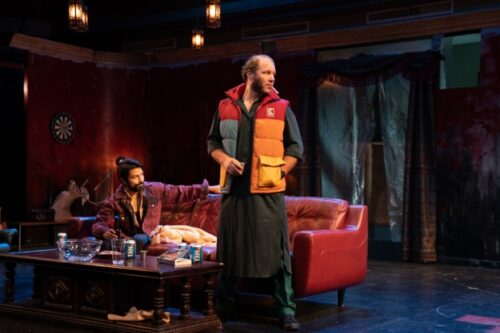CAUGHT BY THE TALE
The Winter’s Tale by William Shakespeare is kind of a weird play. It’s a comedy because a pair of young lovers are united in the end but many awful things happen before these two, crazy kids can tie the knot. The King of Sicilia (Leontes) unjustly suspects his pregnant Queen (Hermione) of being unfaithful to him with his best friend, the King of Bohemia (Polixenes). The Queen is innocent but Leontes has her imprisoned and put on trial. All the stress makes Hermione give birth early in a dungeon to a healthy baby girl, who ends up being one of the aforementioned young lovers. When the Great Oracle confirms that the Queen and Polixenes are innocent, Leontes ignores the Oracle and demands the baby be burned. Apparently, you don’t defy the Oracle because the Queen soon dies as part of Leontes’ punishment for his defiance. Brokenhearted, Leontes tries to repent but it’s too late. And the baby girl wasn’t burned but secreted away to Bohemia, raised by a shepherd and, sixteen years later, falls in love with Polixenes’ son, whom she doesn’t know is really a prince (nor does she know that she’s a princess). There’s a lot more that happens but eventually all is righted when a secret statue of Hermione comes to life and Leonte’s family is reunited because the Oracle said all that’s lost must be found. Um, yeah.
Weird though it may be, the play contains some of Shakespeare’s most powerful and perceptive writing, including Hermione’s self-defense speech at the trial and Leontes’ soliloquys that illustrate the paranoid ruminations of his mind. However, creating a production that makes sense to a modern audience can still be a challenge. So what if one didn’t try to have it make sense at all? Maybe in the not making sense it could possibly, in parts anyway, make better sense and illuminate the human condition in ways that offer more resonance for people alive in 2022? I don’t know if this was an intended goal of Beldlam’s new adaptation of The Winter’s Tale, currently onstage at Irondale Center in Brooklyn, but I would venture to say they accomplished it. With a cast full of stunningly good actors, and directed with vision and courage by company Artistic Director Eric Tucker, this latest Bedlam production offers what many people claim they want from the theater. The show is at times challenging, brilliant, funny, visually fascinating, confusing, indulgent, lengthy, moving and messy. It ain’t easy. It aspires to art and, sometimes, actually hits the mark.
Set in a modern-day, giant loft (the white, gentrifying, hipster-vibe is strong with this one) Tucker’s staging utilizes the large, rectangular space well. He does focus audience attention throughout but simultaneously offers other competing and complimentary sights that may be just as interesting if a person chose to not stick to the main action. With a cast of nine actors who all play multiple roles while never leaving the stage (at least while in Sicilia), it does take some effort to keep up with who’s who and when. And the show starts with three alternate beginnings, which were difficult to follow but effectively announce this will not be a traditional Winter’s Tale.
There is also judicious use of modern day prose (though no writer is credited) interspersed throughout with Shakespeare’s text that actually helps with overall plot clarity and grounding the piece in 2022. But it’s in the keeping of everyone onstage and showing the various realities they are in (some public, some private, all witnessed but not always seen) that we begin to realize that the strictures of the play have fallen away. The script does basically follow the linear storytelling of Shakespeare’s work and all the major plot points and actions are there, though with some updates such as the sheep-shearing festival becomes a Brooklyn rave (I think).
In Sicilia, Tucker and his cast live the characters’ off-stage life onstage simultaneously with the “on-stage” actions, creating an anxiety-ridden, living mosaic of palace life. In Bohemia, the staging is much more straight-forward and less claustrophobic,, establishing the pastoral, laid-back nature of country society. It’s an ingenious way to distinguish the two lifestyles, focused more on physicalizing the inner-life of the characters than changes to the rag-tag set. And with this inner-world foregrounding happening throughout the play, the words come from a less formal and more accessible human place, surprising and re-energizing Shakespeare’s text. For instance, as Leontes, Tucker’s Trumpian ease in cavalierly dismissing the overwhelming evidence about Hermione’s innocence is chilling to witness and helps underscore the enduring truth of Shakespeare’s insights into the human psyche.
The court interrogation scene is now just a husband and wife breaking up on a couch. Beautifully played by both Tucker and super-talented Lisa Birnbaum as Hermione, it’s no longer a king and queen but any marriage falling apart over something misunderstood, unfair and, ultimately cruel. It’s devastating to watch – Shakespearean in its depth of feeling but not “Shakespearean” in its performance style. Yet the text still rings true and clear. As for the other actors in this ensemble, they all deliver splendidly in their respective performances. Katie Hartke as the powerful, truth speaking Paulina and Shaun Taylor-Corbett as the charming survivor Autolycus are well worth the price of admission. And Elan Zafir as the disguised and angry Polixenes surprising then berating his terrified son Florizel, also played by Elan Zafir, is not to be missed.
Does it work? Not always but when it does work it is fairly riveting, which is more often than not. Tucker has ostensibly taken the play out of the royal realm but kept the status dynamics intact and finds clever and inventive ways to portray hierarchy on John McDermott’s sprawling, dilapidated, specific yet undefined loft set. Daniele Tyler Mathews’ eclectic costumes have footprints in mostly the sixties and seventies and Carolina Ortiz’s lighting effectively indicates all of the locations the show inhabits – be they physical, emotional or psychological.
Bedlam’s latest trip to the Shakespeare Canon is not for everyone and purists should probably stay home. Though that might be a missed opportunity to discover something new about the play due to Bedlam’s deconstruction then inner-world re-assembly of The Winter’s Tale. But if you enjoy a theatrical experience that’s difficult, well-acted, insightful, sometimes funny and probably too long – this sprawling loft in Brooklyn is worth a visit.
The Winter’s Tale
Bedlam at Irondale Center in NYC, ends on Nov. 20, 2022




